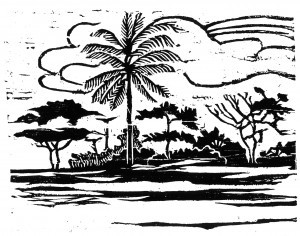The presence of God in all Creation by George C. George

George C. George is an M.Div. candidate at Emmanuel College and is completing his Contextual Theology internship at KAIROS this academic year.
What does care of creation have to do with our faith? This week’s texts offer some lessons, but in fact, creation –and God’s work within it– is a persistent theme in the Bible.
Imagine Jesus walking through the landscape of Palestine as a person familiar with the mountains, water bodies, seashores and other terrains. Jesus talked about God’s relationship with humankind using many symbols from nature: God cares for the lilies of the field and the birds in the sky, the water of life signifies eternity, and the image of vine and branches symbolizes being one with God. The baptism of Jesus in the river Jordan symbolizes his death and resurrection; his immersion into the water of Jordan was an anointing for his mission. The knowledge of God is portrayed in various ways through creation leading us to exist in shalom with creation upholding justice.
In the reading for this Sunday from Joshua 3 we learn about the crossing of the river Jordan. The presence of God is evident when the waters of Jordan are made to stand still. That was a moment of shalom. But human beings do not always work towards shalom with all creation, and this is reflected in the state of the environment. Yet as Psalm 107 tells us, the restorative action of God always offers hope.
33 He turns rivers into a desert,
springs of water into thirsty ground,
34 a fruitful land into a salty waste,
because of the wickedness of its inhabitants.
35 He turns a desert into pools of water,
a parched land into springs of water.
The scriptures underline the work of a loving God who challenges us to honour creation and transform humanity.
The struggle for water around the world today signals our disconnect with creation and degradation. It is a spiritual crisis that the ecumenical community strives to address. During the World Council of Churches festival marking the end of the Decade of Churches in Solidarity with Women held in Harare, Zimbabwe in 1998, women from around the globe brought water from their regions and poured it into a big jar on the stage. This act symbolized water as the source of life and celebrated the presence of God’s Spirit in their midst in spite of many differences. It also symbolized their tears of pain amidst struggles of war, poverty and oppression.
More recently in Canada, KAIROS encouraged communities from across the country to gather at and bring waters to Victoria Island in Ottawa as a part of its “Our Waters, Our Life” action. Those present, led by Indigenous grandmothers, enacted sacred rituals recognizing water as the source of life. This action affirmed the connection between our waters and our life through solidarity with Indigenous peoples and protection of the waters.
Water is essential for human subsistence and large scale diversion of water for profit-making operations like the resource extraction industries reduces the place of water in our life to a commodity. Degradation of water is another problem that we face. The fate of huge amount of water ending up in tailing ponds in the oil sands is uncertain. In an era when Canada needs more environmental laws, changes made by the omnibus budget bills C-38 and C-45 amended existing provisions for environmental assessments to fast track resource extraction projects, and removed protections under the Navigable Waters Protection Act. An overdependence on natural resources for economic growth often makes developing human resources less of a priority.
Nature is so often treated as an entity separate from human society. We have much to learn from Indigenous understandings of living well with nature, and of caring for the needs of many generations to come. The understanding of the presence of God in all creation and the knowledge of God portrayed through creation inspires us to have a sacred connection with nature. It calls for a response of justice towards creation, the silent “other” which, through climate change and water degradation, speaks to humanity of broken relations. Let the rain, snow and the wind awaken us to a new consciousness of eco-spirituality that enables us to imagine ways to live with nature, upholding ecological relations.
In Psalm 43 the psalmist longs to go to the dwelling place of God in nature.
3 O send out your light and your truth;
let them lead me;
let them bring me to your holy hill
and to your dwelling.
4 Then I will go to the altar of God,
to God my exceeding joy;
and I will praise you with the harp,
O God, my God.
